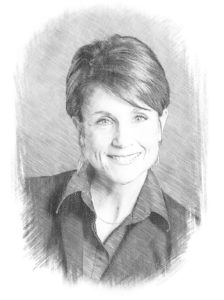Meet Nicole Fox from The Platte Institute
By The Policy Circle Team
The Platte Institute seeks to advance policies that remove barriers to growth and opportunity in Nebraska. We interviewed Nicole Fox to learn more about her role with the Nebraskan think tank.
What do you do at the Platte Institute and what do your day-to-day activities look like? 
I serve as Director of Government Relations. Essentially, I am the face and voice of the Platte Institute at our state’s capitol. I work with state senators, their legislative staff, state agency employees and the Governor’s staff to promote the Platte Institute’s legislative priorities which include those pertaining to free market and economic development policies to grow Nebraska’s economy.
Day to day activities include communications and meetings with legislative and executive branch staff, preparing and presenting legislative testimony, interacting with potential stakeholders impacted by the policy areas of interest to the Platte Institute and collaborating with other organizations that share our same interests to promote free market economic policies.
What is the biggest challenge you face in this role?
Since a majority of my work is interacting with elected officials, I find that politics can have a big influence on whether or not policy moves forward.
How has your background informed your current role?
Prior to my work at the Platte Institute, I worked in healthcare for 18 years. I served as both President and Public Policy Coordinator for my state’s professional organization affiliate. I also served on my parent professional organization’s national legislative and public policy committee for three years. It was through this work that I became involved in grassroots advocacy for both state and federal health related policy.
In 2015, my state senator stepped down, and I was appointed to take his place in the Nebraska Legislature. Living the life of a state senator helped me understand the demands and pressures on policy makers and agency heads. As a state senator, I knew what my expectations were of organizations like the Platte Institute, so I think this helps in my approach to working with these individuals.
What do you think is the most important lesson you’ve learned in your position?
Relationships are crucial. Never take anything personally. Also, just because on one policy issue there is disagreement (whether with a policy maker or an interest group), doesn’t mean you won’t find common ground on a different issue.
What is one thing you wish more people knew about your line of work?
Director of Government Relations means “lobbyist.” I feel like the public generally views lobbyists negatively. I am not a contract lobbyist. Many contract lobbyists are paid to advocate positions on policy issues stipulated by the interested party hiring them, and they may agree to represent the group regardless if they agree personally with that position or not. The contract lobbyists may be representing liberal and conservative stances on a variety of policy issues simultaneously.
The Platte Institute is a non-profit free market economic think tank. Our primary goal is to be a policy research resource in this particular area specifically, and our team aligns both professionally and personally with these ideals.
Can you think of an example where civic engagement led to a change in public policy?
I know this doesn’t directly answer the question, but my advice to “volunteers” and citizens is that one doesn’t have to memorize lots of statistics and data to sway policy makers and make a difference. One can make a great impact just by sharing a story, by being able to discuss how policy affects their day to day life through a real world example.
What does public policy leadership mean to you?
Influencing others by promoting active participation – by this I mean leading by example and attending a city council meeting, a school board meeting, a town hall or legislative hearing; or by writing/calling your elected official. If you don’t make your voice heard, it won’t get heard.
Now for some lighthearted questions! What does your morning routine look like?
I need “me time” in the morning which usually means a run or some yoga. It also includes reviewing the news headlines and social media to stay up to date on current events affecting my work.
Are you reading a book right now? If so, what is it and why did you choose it?
An Inquiry into the Nature and Causes of the Wealth of States: How Taxes, Energy, and Worker Freedom Change Everything. One of the co-authors, Stephen Moore spoke at an event I attended and encouraged attendees to put the book on their reading list, so I did just that.
How do you unwind?
Running, yoga, travel, cooking, listening to music, reading. Like many people, I have a “bucket list” that I’m working to tackle.
What is a food you cannot live without?
Dessert – I have a terrible sweet tooth!
What’s the best way for people to get in touch with you?
The best way to reach me is at nfox@platteinstitute.org
The Policy Circle is a 501(c)3 that provides a fact-based, nonpartisan framework that inspires women living in the same community to connect, learn about and discuss public policies that impact their lives. Women across the nation are taking a leadership role in public policy dialogue on what human creativity can accomplish in a free market economy.